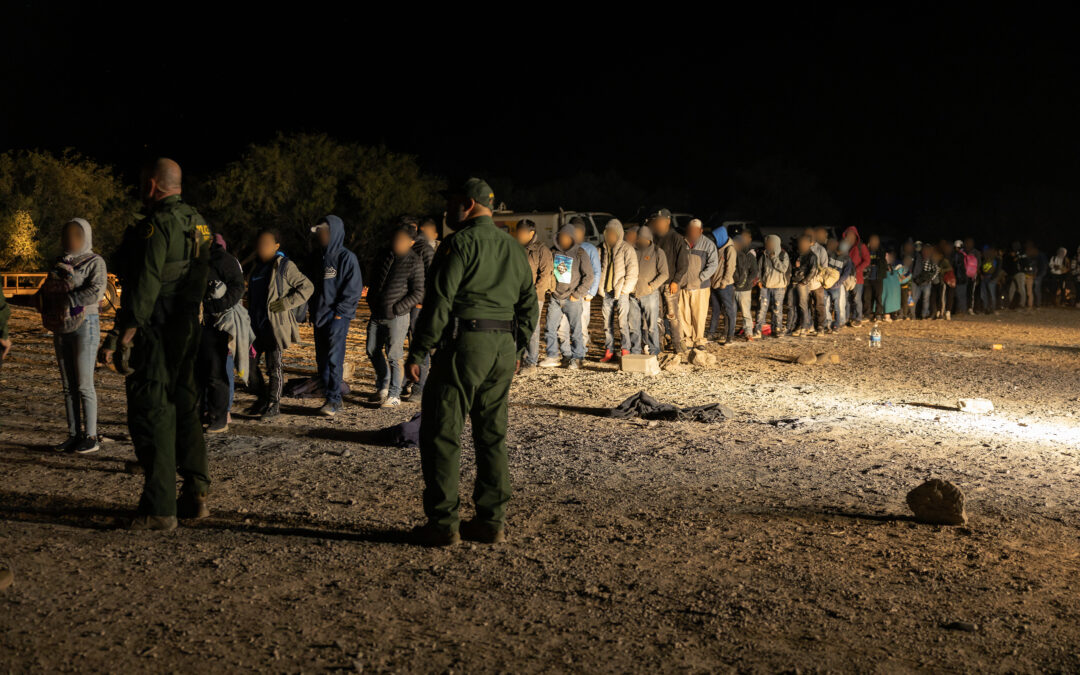
by Daniel Stefanski | Dec 6, 2024 | Education, News
By Daniel Stefanski |
The first piece of legislation in the Arizona House of Representatives for the upcoming 57th Regular Session was introduced by a soon-to-be second-term Republican lawmaker.
Last week, state Representative Matthew Gress announced that he had introduced his chamber’s first bill, stating that “this constituent-inspired legislation will help address the regulatory lag that is disrupting access to mental healthcare professionals.”
An Arizona resident responded to the news, saying, “I absolutely love this. I never knew what an issue mental health could be until I saw some of my friends in the Army struggling with it after encountering horrible things. We lose more vets to mental health issues than combat. Access to care is an issue that must be addressed.”
Not everyone on the X platform was on board with the proposal, however. One account asked, “What is the problem to solve here? This bill problematically gives an out of state counselor who has committed an act that would be cause for discipline, or has had their license revoked, or is under investigation for misconduct – a free pass to work in AZ. Health professions are regulated precisely to protect the health, safety and welfare of the public – no one’s guaranteed a license unconditionally.”
Gress fired back at the detractor of his bill, saying, “Right now, if you go to school to become a social worker, counselor, marriage and family therapist, or addiction counselor, you are required to build clinical hours by having patients. In order to do this, the student must undergo a background check. Here’s the problem: Under the status quo, once someone graduates, that individual must stop working and patients are shown the door. Many patients don’t or can’t find an alternative despite developing a trusting relationship with the therapist who just graduated.”
The Republican lawmaker added, “This is an outdated and unexplainable piece of red tape that inhibits people who’ve gotten their degrees and their experience to start working sooner. HB 2001 is a simple reform. If you’ve completed the hours and work, they count. We need good people and more people going into this field, especially with rising suicide rates and the worst mental health crisis we’ve ever seen.”
Legislators will be officially back in action in just over a month as Arizona returns to its status of a divided government for at least another two years.
Daniel Stefanski is a reporter for AZ Free News. You can send him news tips using this link.

by Daniel Stefanski | Dec 6, 2024 | News
By Daniel Stefanski |
Arizona’s Senate President recently highlighted the exorbitant cost of illegal immigration to his state.
Last week, state Senator Warren Petersen shared a recent study on what the city of Denver, Colorado was spending on illegal immigration. He contrasted Denver’s “sanctuary city” approach to that just experienced by the State of Arizona, where voters passed a border security ballot measure, Proposition 314.
Petersen said, “And the media in AZ was pushing a false narrative that it would cost us money to enforce immigration laws. When in fact we save money. The cost of illegal immigration to AZ is 2 Billion. Cost of enforcement is significantly less. The voters didn’t buy the false media narrative. They passed our border security act by nearly 2 to 1.”
The study promoted by the Arizona legislator was from the Common Sense Institute, which showed that Denver had expended $356 million of taxpayer dollars on illegal immigrants – almost $8,000 per foreign national purportedly in the municipality, which amounts to eight percent of its 2025 budget.
According to the Federation for American Immigration Reform (FAIR), illegal immigration cost Arizona taxpayers around $3.19 billion in 2023 – an annual burden of $1,189 for each state household (or each illegal alien costing the state $5,230). As in Denver, a large share of that financial total was for educational expenses ($1.36 billion). More than half a billion dollars was shelled out for police, legal, and corrections in the Grand Canyon State.
In 2023, it was estimated that 453,000 illegal immigrants lived in Arizona, with their households sending 109,602 students to local schools.
Last month, Arizona voters overwhelmingly passed Proposition 314, which was referred to the ballot by Republican legislators earlier this year – with almost 63% of voters supporting the measure. Prop 314, which mostly is in effect now, gives local law enforcement and communities more resources to combat illegal immigration in their state and to protect innocent men, women, and children from the dangers that the open border has increasingly presented over the past four years of the Biden-Harris administration.
Daniel Stefanski is a reporter for AZ Free News. You can send him news tips using this link.

by Daniel Stefanski | Dec 5, 2024 | News
By Daniel Stefanski |
A southern Arizona elections official is facing a potential investigation over her jurisdiction’s execution of the recent November General Election.
On Monday, state Representatives Teresa Martinez and Rachel Jones sent a request to Arizona Attorney General Kris Mayes, asking her office to conduct an investigation “into the Pima County Recorder Gabriella Cazares-Kelly’s handling of the 2024 General Election.”
The Republican lawmakers raised a number of issues stemming from the election in Pima County, including “shutting down of early ballot request portal, inmate voter registration program, [and] handling of undeliverable and returned ballots.”
“Election integrity is the foundation of our democracy, and voters deserve to know their elections are being administered fairly, lawfully, and transparently,” said Representative Martinez. “The numerous irregularities and lack of accountability from the Pima County Recorder’s Office demand a full investigation.”
“When nearly 4,000 voters face barriers to requesting a ballot, and when questions about unlawful voting and ballot processing are met with silence, it’s clear that immediate action is needed to restore public trust,” added Representative Jones.
In their letter to Mayes, the two legislators wrote, “Arizonans deserve free, fair, and transparent elections. In light of your recent decision to immediately investigate President-Elect Donald Trump over his speech (although you later determined his remarks were protected by the First Amendment), we hope you will agree that Recorder Cázares-Kelly’s alarming conduct administering the 2024 General Election warrants a thorough investigation.”
The Pima County Recorder appears to be a proud Democrat activist alongside her nonpartisan position as an election official. During this just-completed elections cycle, Cázares-Kelly posted a picture with Jane Fonda, and boasted about shaking former President Barack Obama’s hand at a political event.
Cázares-Kelly also shared a video of Mayes dancing at a political rally in October.
Daniel Stefanski is a reporter for AZ Free News. You can send him news tips using this link.

by Daniel Stefanski | Dec 4, 2024 | News
By Daniel Stefanski |
Republicans in the Arizona Legislature scored another legal victory with the nation’s high court granting cert on a case they had intervened in earlier this year.
On November 22, the Supreme Court of the United States agreed to hear FCC v. Consumers’ Research in its current term. The case will be consolidated with SHLB Coalition v. Consumers’ Research. This case involves a question of the nondelegation doctrine, which, according to the Legal Information Institute at Cornell, is “the principle that Congress cannot delegate its legislative powers or lawmaking ability to other entities.”
The decision from the U.S. Supreme Court represents a significant victory for Republicans in the Arizona Legislature, who had joined an amicus brief from state attorneys general from around the country to urge the justices to hear arguments in this case.
On its X account, Consumers’ Research reacted to the order, writing, “American citizens and consumers alike deserve basic accountability in government and in the marketplace. Americans currently are forced to pay a tax with every phone bill, set by unelected bureaucrats, at the recommendation by the same private corporation that receives the revenue. This is absurd and we believe SCOTUS will agree as the 5th circuit did.”
Arizona Senate President Warren Petersen, who was instrumental in the Arizona Legislature joining the efforts to support Consumers’ Research, told AZ Free News that, “These carriers are unlawfully taxing the public to the tune of billions of dollars. Congress should instead determine what taxes our citizens are to pay and by how much, not unelected Washington bureaucrats.”
The brief that the Arizona Legislature signed onto was joined by 15 other states, led by the West Virginia attorney general. The other states were Alabama, Arkansas, Indiana, Kansas, Louisiana, Missouri, Montana, Nebraska, Ohio, Oklahoma, South Carolina, Tennessee, Texas, and Virginia.
In their brief, the attorneys general argued that “the states – and our country – need guidance on the nondelegation doctrine,” that “those who mean to scare the court away from these issues are wrong,” that “preserving Congress’s legislative power protects the states’ interests,” and that “this court should evaluate this statute.”
They wrote, “Every year, the Federal Communications Commission extracts billions from American consumers based on a vague statute that says telecommunications providers ‘should make an equitable and nondiscriminatory contribution to the perseveration and advancement of universal service.’ The only limits on this multi-billion-dollar fee are vague notions like ‘quality’ service. And the Commission – an independent agency already shielded from accountability in its own right – doesn’t even set these rates itself. Instead, a private company picks a number that the Commission rubberstamps later.”
The attorneys general added, “Make no mistake: Amici States recognize the goal of securing universal telecommunications service is laudable. Congress can and should find a way to provide these services for everyone. But it’s a ‘fundamental principle that, no matter how laudable its purposes, the actions of our government are always subject to the limitations of the Constitution.’ Congress needs to be the one to act here, not a private band of unaccountable industry participants. The Court should grant the Petition to say so.”
The Court’s decision to hear arguments in this matter follows an opinion from the U.S. Court of Appeals for the Fifth Circuit in July, which found that “this misbegotten tax violates Article I, Section I of the Constitution.” The appeals court stated, “The Q1 2022 USF Tax is not only difficult to square with the Supreme Court’s public nondelegation precedents. It was also formulated by private entities. That raises independent but equally serious questions about its compatibility with Article 1, Section 1, which requires ‘[a]ll legislative Powers herein granted shall be vested in a Congress.’ We (1) explain that the scope of FCC’s delegation to private entities may violate the Legislative Vesting Clause by allowing private entities to exercise government power. Then we (2) explain that even if FCC’s delegation could be constitutionally justified, FCC may have violated the Legislative Vesting Clause by delegating government power to private entities without express congressional authorization.”
According to SCOTUSblog, this case will likely be argued before the U.S. Supreme Court in the spring of 2025. The justices’ opinion will be rendered in June or July at the conclusion of their term.
Daniel Stefanski is a reporter for AZ Free News. You can send him news tips using this link.

by Daniel Stefanski | Dec 3, 2024 | News
By Daniel Stefanski |
The Arizona Legislature’s two Second Amendment hawks achieved a major victory for their constituents’ freedoms.
Earlier this month, the Sedona City Council announced plans to reconstruct a local ordinance that had caught the ire of two Republican state legislators this fall, Representatives Quang Nguyen and Selina Bliss. The news came after the lawmakers had taken their dispute to the Arizona Attorney General’s Office over the City of Sedona’s Ordinance 12.30.090, which prohibits individuals from carrying firearms on “any trail or open space area.”
Nguyen had previously written, “The City of Sedona has had ample time to address these concerns and has chosen not to act. We are left with no choice but to seek the Attorney General’s involvement to ensure the rule of law is followed.”
The letter to Mayes followed Representative Nguyen’s prior communication to Sedona Mayor Scott Jablow and city councilmembers over the ordinance. Nguyen had highlighted that the Ordinance’s prohibition “on carrying firearms is not consistent with Arizona Revised Statutes § 13-3108,” thus making it “invalid and unenforceable because it exceeds what state law authorizes. He pointed out that “cities may…enact ordinances ‘[l]imiting or prohibiting the discharge of firearms in parks and preserves’ when certain statutory conditions are met.”
In a comment to another local publication, a City of Sedona spokeswoman said, “In the new ordinance, a person will be able to carry the firearm in the park but can’t discharge it unless in self-defense.” This ordinance is expected to be updated on December 10, at the next city council meeting.
Bliss responded to the announcement from the municipality, saying, “A message to cities and towns…don’t violate the rights of the people!”
Nguyen and Bliss, two seatmates in a Yavapai County legislative district, have quickly proven themselves to be some of the top Second Amendment advocates in the state. Over the past two years, both lawmakers have won the “Legislator of the Year” award from the Arizona Citizens Defense League for their protection of Second Amendment rights. They will look to continue their defense of Arizonans’ constitutional rights to keep and bear arms in the upcoming legislative session in yet another divided state government.
Daniel Stefanski is a reporter for AZ Free News. You can send him news tips using this link.





